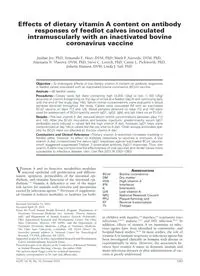
2013 Effects of dietary vitamin A content on antibody responses of feedlot calves inoculated intramuscularly with an ina PDF
Preview 2013 Effects of dietary vitamin A content on antibody responses of feedlot calves inoculated intramuscularly with an ina
AJVR, Vol 74, No. 10, October 2013 1353 Effects of dietary vitamin A content on antibody responses of feedlot calves inoculated intramuscularly with an inactivated bovine coronavirus vaccine Junbae Jee, PhD; Armando E. Hoet, DVM, PhD; Marli P. Azevedo, DVM, PhD; Anastasia N. Vlasova, DVM, PhD; Steve C. Loerch, PhD; Carrie L. Pickworth, PhD; Juliette Hanson, DVM; Linda J. Saif, PhD Objective—To investigate effects of low dietary vitamin A content on antibody responses in feedlot calves inoculated with an inactivated bovine coronavirus (BCoV) vaccine. Animals—40 feedlot calves. Procedures—Calves were fed diets containing high (3,300 U/kg) or low (1,100 U/kg) amounts of vitamin A beginning on the day of arrival at a feedlot (day 0) and continuing daily until the end of the study (day 140). Serum retinol concentrations were evaluated in blood samples obtained throughout the study. Calves were inoculated IM with an inactivated BCoV vaccine on days 112 and 126. Blood samples obtained on days 112 and 140 were used for assessment of BCoV-specific serum IgG1, IgG2, IgM, and IgA titers via an ELISA. Results—The low vitamin A diet reduced serum retinol concentrations between days 112 and 140. After the BCoV inoculation and booster injections, predominantly serum IgG1 antibodies were induced in calves fed the high vitamin A diet; however, IgG1 titers were compromised at day 140 in calves fed the low vitamin A diet. Other isotype antibodies spe- cific for BCoV were not affected by the low vitamin A diet. Conclusions and Clinical Relevance—Dietary vitamin A restriction increases marbling in feedlot cattle; however, its effect on antibody responses to vaccines is unknown. A low vitamin A diet compromised the serum IgG1 responses against inactivated BCoV vaccine, which suggested suppressed T-helper 2–associated antibody (IgG1) responses. Thus, low vitamin A diets may compromise the effectiveness of viral vaccines and render calves more susceptible to infectious disease. (Am J Vet Res 2013;74:1353–1362) Received November 15, 2012. Accepted April 29, 2013. From the Food Animal Health Research Program, Department of Veterinary Preventive Medicine (Jee, Azevedo, Vlasova, Hanson, Saif), and Department of Animal Sciences (Loerch, Pickworth), Ohio Agricultural Research and Development Center, The Ohio State University, Wooster, OH 44691; and the Department of Veterinary Preventive Medicine, College of Veterinary Medicine, The Ohio State University, Columbus, OH 43210 (Hoet). Dr. Azevedo’s present address is National Center for Toxicological Research, US FDA, Jefferson, AR 72079. Supported in part by an Ohio Agricultural Research and Development Center Interdisciplinary Research Grant. Presented in part as an abstract at the Conference of Research Workers in Animal Diseases Meeting, Chicago, December 2008. The authors thank Peggy Lewis for technical assistance. Address correspondence to Dr. Saif (
